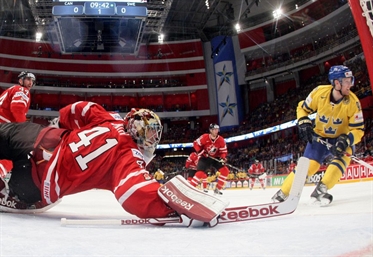Respectful rivalry for gold
Respectful rivalry for gold
There’s no hate, but today only one team wins

 Canada's Mike Smith makes a save against Sweden's Gabriel Landeskog in the quarter-finals of the 2013 IIHF Ice Hockey World Championship. Sweden went on to win gold. Who will win in Sochi? Photo: Andre Ringuette / HHOF-IIHF Images
Canada's Mike Smith makes a save against Sweden's Gabriel Landeskog in the quarter-finals of the 2013 IIHF Ice Hockey World Championship. Sweden went on to win gold. Who will win in Sochi? Photo: Andre Ringuette / HHOF-IIHF Images
Today’s hockey gold is the final medal awarded at these Olympics, and for both nations it’s the only one that matters—men’s hockey.
The referees are both from the NHL, and this suits both teams fine because all players on both teams are NHLers with the exception of Sweden’s Jimmie Ericsson. The whistle blowers will not matter in this one and will not be the difference between winning and losing. More important factors come into play.
In the blue ice...
When Henrik Lundqvist led Sweden to gold in 2006, Carey Price was between appearances for Canada at the U18 and U20. Now, Lundqvist is a week away from his 32nd birthday and Price is a 26-year-old in his prime and proving he can answer the call for the big games. Both goalies have been great when needed, so you can count on today’s game being a low-scoring. First goal is huge—and it might be the only goal.
All NHL...
As mentioned, all players excepting one are from the NHL, so everyone knows everyone. There won’t be any surprises. Daniel Sedin’s moves won’t be a mystery to Canada, and Sidney Crosby’s skills are well-known to the Swedes.
Left and right...
Sweden has only three right-handed shots and only one of eight defencemen shoots right (Erik Karlsson). As well, the team has just two forwards who shoot right (Daniel Alfredsson and Jakob Silfverberg. Canada, though, has an even number of left and right-shooting defencemen and five forwards who shoot right. Four of the six leading scorers shoot right. It might seem trivial, but it can make a huge difference on faceoffs, one-timers, and passing to the right wing if you have a right-handed shot instead of the more awkward left in those situations.
Bumper blueliners...
Both teams have relied heavily on their defencemen for success. Canada’s top scorers are Drew Doughty and Shea Weber, while Duncan Keith and Jay Bouwmeester have logged NHL amounts of ice time. On Tre Kronor, Erik Karlsson shares the tournament lead with eight points while Niklas Hjalmarsson and Niklas Kronwall have been almost as superb.
Off the draw...
Canada has had better success on the faceoffs than Sweden so far, a detail which could prove valuable today. Win the draw, get first puck possession, get control of the game. Lose the draw, start defending all the time. It gets risky.
Home team...
Sweden will be the home team and as such will have last change. If Par Marts decides to match lines, the advantage will be his. Mike Babcock, however, knows how to control a bench as well as any coach in the world, so he won’t be fazed by anything Marts has planned.
The Crosby factor...
Crosby and linemates Chris Kunitz and Patrice Bergeron were sensational last game, and although they didn’t score they seem destined to break out. If they do, their contributions might well be the difference in the game.
Sweden’s offence...
As with Canada, it’s been about defence more than scoring this Olympics. Four Swedish forwards have two goals, and Daniel Sedin has a goal and four assists. He’s been relatively quiet without his brother, and if he can beat Crosby to a breakout game, Daniel could be Sweden’s difference-maker.
1994...
Of course, the last time these countries met for Olympic gold was 1994 when Peter Forsberg scored his famous shootout winner. Canada and Sweden have won Olympic gold twice each since 1994, the only multiple winners. Canada, though, beat Sweden in the 2003 and 2004 World Championship gold-medal games. Of the 12 NHL captains in Sochi, seven are on Canada’s roster, so leadership, experience, grace under pressure are all factors that favour Canada.
The last time...
In a way, Sweden helped Canada win gold in Salt Lake. Recall that the first game for both teams in 2002 was a 5-2 Sweden win. Mats Sundin scored two goals on Toronto Maple Leafs teammate Curtis Joseph, resulting in coach Pat Quinn putting Martin Brodeur in goal for the rest of the tournament. Canada won gold, and the Swedes were eliminated in the quarter-finals on Vladimir Kopat’s fluky goal for Belarus.
Scoring vs defence...
Both teams have tremendous talent up front even though it has been the defencemen who have shone brightest so far. Canada has more individual talent—the big names—but Sweden has a history of great team play. Coaches will matter; goalies will matter; stars playing like stars; execution on the power play; poise and experience are all vital to victory.
Perhaps, though, the single attribute that will lift one team to victory will be, to quote a Russian goalie from four years ago, the team that comes out playing like gorillas released from a cage. The team that goes all out and intimidates with speed will win Olympic gold in 2014.
Back to Overview











































